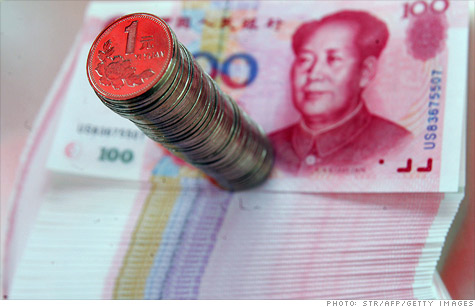Search News

Senate wants to slap duties on Chinese imports in response to China's undervalued currency.
WASHINGTON (CNNMoney) -- The Senate is taking a swipe at China's undervalued currency -- long accused of hampering the U.S. economy by spurring global trade imbalances and economic hardship for U.S. manufacturers.
The Senate is considering a bill that would slap new duties on imports from nations whose currency is undervalued -- a provision aimed squarely at China. After clearing a test vote Monday evening by a 79-19 vote, the Senate could pass the measure later this week.
But the Republican-controlled House is not expected to take up the bill, an aide confirmed Monday, making this more of a political exercise than an attempt at legislating. The Senate bill resembles a House bill passed when Democrats controlled that chamber last year.
For years, U.S. officials have been pressuring China to allow its renminbi -- or yuan -- to appreciate more rapidly. Between 2008 and 2010, China had pegged the yuan to the dollar, keeping its value artificially low and Chinese exports comparatively cheap.
Besides hiking tariffs on Chinese goods the bill would also take aim at the administration, which already has some ability to point out nations that purposefully manipulate their currency, but has avoided doing so.
The bill would:
-- Force the administration to officially red flag nations whose currencies are undervalued for long periods with the term "fundamentally misaligned currency."
-- Make it tougher for the Commerce Department to ignore calls to investigate accusations of undervalued currencies.
-- Force the administration to give Congress a list of nations with "misaligned" currencies.
And if a nation is accused of having an undervalued currency and makes no effort to rebalance the currency for three months or more, that's when the tariffs kick in.
The bill also:
-- Prevents the federal government from buying goods and services from that nation.
-- Prevents the U.S. trade promotion agency, the Overseas Private Investment Corporation, from investing in that nation.
Chinese leaders decried the bill on Sunday. The official news agency Xinhua accused the U.S. leaders of politicizing the yuan, and warned that trade conflict "always leads to bilateral damage" in an editorial on the agency's website.
"To put it simply, current anti-yuan moves in the U.S. Senate are more like a publicity attempt to attract voters and distract attention from the real problems facing the U.S. economy," the editorial said.
Most big business groups from the U.S. Chamber of Commerce to the Club for Growth oppose the bill. Union groups support it.
The Obama administration has taken the stance that the best course of action is diplomacy and not knee-jerk penalties, pointing out China's moves to allow the yuan appreciate slightly. White House officials said Monday they're reviewing the Senate bill.
Despite its overall grim prospects, Democrats frustrated with political stalemate are pushing forward with the bill, which has picked up some Republican support.
"There's no longer any question that China's unfair trade policies are having a detrimental effect on our economy," said New York Sen. Charles Schumer in a call with journalists on Friday. "There is probably nothing we can do to create jobs better than by correcting China's trade imbalance. " ![]()
| Overnight Avg Rate | Latest | Change | Last Week |
|---|---|---|---|
| 30 yr fixed | 3.80% | 3.88% | |
| 15 yr fixed | 3.20% | 3.23% | |
| 5/1 ARM | 3.84% | 3.88% | |
| 30 yr refi | 3.82% | 3.93% | |
| 15 yr refi | 3.20% | 3.23% |
Today's featured rates:
| Latest Report | Next Update |
|---|---|
| Home prices | Aug 28 |
| Consumer confidence | Aug 28 |
| GDP | Aug 29 |
| Manufacturing (ISM) | Sept 4 |
| Jobs | Sept 7 |
| Inflation (CPI) | Sept 14 |
| Retail sales | Sept 14 |